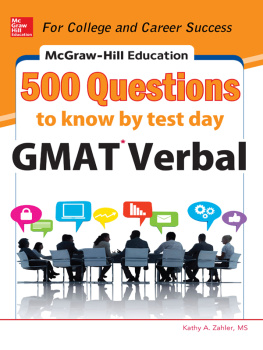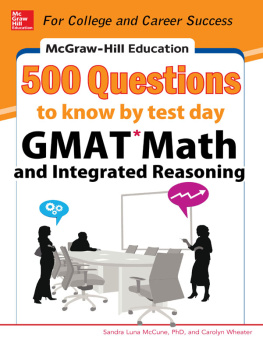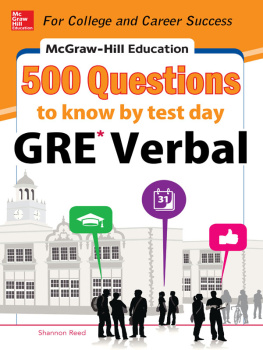About the Authors
Denise M. Stefano, CPA, CGMA, MBA, is an associate professor of accounting and the accounting program chairperson with Mercy College. She serves as a board member to the New York State Society of Certified Public Accountants at the New York State level.
Darrel Surett, CPA, taught accounting, business law, and income tax courses for 25 years as an adjunct professor at Union County College. He is a partner in the CPA firm of Barry Surett & Co.

Copyright 2017 by McGraw-Hill Education. All rights reserved. Except as permitted under the United States Copyright Act of 1976, no part of this publication may be reproduced or distributed in any form or by any means, or stored in a database or retrieval system, without the prior written permission of the publisher, with the exception that the program listings may be entered, stored, and executed in a computer system, but they may not be reproduced for publication.
ISBN: 978-1-25-958629-3
MHID: 1-25-958629-4
The material in this eBook also appears in the print version of this title: ISBN: 978-1-25-958630-9, MHID: 1-25-958630-8.
eBook conversion by codeMantra
Version 1.0
All trademarks are trademarks of their respective owners. Rather than put a trademark symbol after every occurrence of a trademarked name, we use names in an editorial fashion only, and to the benefit of the trademark owner, with no intention of infringement of the trademark. Where such designations appear in this book, they have been printed with initial caps.
McGraw-Hill Education eBooks are available at special quantity discounts to use as premiums and sales promotions or for use in corporate training programs. To contact a representative, please visit the Contact Us page at www.mhprofessional.com.
This publication is designed to provide accurate and authoritative information in regard to the subject matter covered. It is sold with the understanding that neither the author nor the publisher is engaged in rendering legal, accounting, securities trading, or other professional services. If legal advice or other expert assistance is required, the services of a competent professional person should be sought.
From a Declaration of Principles Jointly Adopted by a Committee of the American Bar Association and a Committee of Publishers and Associations
TERMS OF USE
This is a copyrighted work and McGraw-Hill Education and its licensors reserve all rights in and to the work. Use of this work is subject to these terms. Except as permitted under the Copyright Act of 1976 and the right to store and retrieve one copy of the work, you may not decompile, disassemble, reverse engineer, reproduce, modify, create derivative works based upon, transmit, distribute, disseminate, sell, publish or sublicense the work or any part of it without McGraw-Hill Educations prior consent. You may use the work for your own noncommercial and personal use; any other use of the work is strictly prohibited. Your right to use the work may be terminated if you fail to comply with these terms.
THE WORK IS PROVIDED AS IS. McGRAW-HILL EDUCATION AND ITS LICENSORS MAKE NO GUARANTEES OR WARRANTIES AS TO THE ACCURACY, ADEQUACY OR COMPLETENESS OF OR RESULTS TO BE OBTAINED FROM USING THE WORK, INCLUDING ANY INFORMATION THAT CAN BE ACCESSED THROUGH THE WORK VIA HYPERLINK OR OTHERWISE, AND EXPRESSLY DISCLAIM ANY WARRANTY, EXPRESS OR IMPLIED, INCLUDING BUT NOT LIMITED TO IMPLIED WARRANTIES OF MERCHANTABILITY OR FITNESS FOR A PARTICULAR PURPOSE. McGraw-Hill Education and its licensors do not warrant or guarantee that the functions contained in the work will meet your requirements or that its operation will be uninterrupted or error free. Neither McGraw-Hill Education nor its licensors shall be liable to you or anyone else for any inaccuracy, error or omission, regardless of cause, in the work or for any damages resulting therefrom. McGraw-Hill Education has no responsibility for the content of any information accessed through the work. Under no circumstances shall McGraw-Hill Education and/or its licensors be liable for any indirect, incidental, special, punitive, consequential or similar damages that result from the use of or inability to use the work, even if any of them has been advised of the possibility of such damages. This limitation of liability shall apply to any claim or cause whatsoever whether such claim or cause arises in contract, tort or otherwise.
Darrel Surett dedicates this book to his father, Barry, who taught college accounting for over 50 years.
Denise M. Stefano dedicates this book to her daughter, Catalina, and all of her students, who collectively inspire her to be the best educator she can be.
CONTENTS
INTRODUCTION
Youve taken a big step toward CPA exam success by purchasing McGraw-Hill Education: 2,000 Review Questions for the CPA Exam. This book gives you 2,000 multiple-choice questions, combining theory and practice, and covering the most essential material for all four parts of the Uniform CPA Examination: Auditing and Attestation, Business Environment and Concepts, Financial Accounting and Reporting, and Regulation. Each question is clearly explained in the answer key. The questions will give you valuable independent practice to supplement your other studies.
You might be the kind of student who needs extra study a few weeks before the exam for final review. Or you might be the kind of student who puts off preparing until the last minute before the exam. No matter what your preparation style, you will benefit from reviewing these 2,000 questions, which closely parallel the content of the actual CPA exam. These questions and the explanations in the answer key are the ideal last-minute study tool for those final weeks before the test.
If you practice with all the questions and answers in this book, we are certain you will build the skills and confidence needed to excel on all sections of the CPA exam. Good luck!
PART I
AUDITING AND ATTESTATION
CHAPTER 1
PROPER USE OF THE TERM AUDIT AND AN OVERVIEW OF AUDITING
QUESTIONS 111
. Which of the following standards-setting bodies has authority to issue auditing standards for financial statement audits of nonissuers?
I. Auditing Standards Board
II. Public Company Accounting Oversight Board
A. I only
B. II only
C. Both I and II
D. Neither I nor II
. Whenever an independent expert is brought in to examine financial statements with hopes of adding credibility, that engagement and reporting process is known as an:
I. audit
II. attestation
A. I only
B. II only
C. Both I and II
D. Neither I nor II
. A CPA performed the following engagements in February of Year 3. Which is considered an attestation engagement?
I. Audit of Year 2 financial statements
II. Examination of Year 4s proposed financial information
A. I only
B. II only
C. Both I and II
D. Neither I nor II
. After an audit, the financial statements are the responsibility of:
I. the independent auditor
II. the management of the reporting company
A. I only
B. II only
C.
Next page




